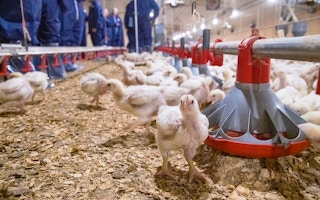Green Century Capital Management, the impact investment group that was pushing for Tyson Foods Inc. to rid its supply chain of unsustainable practices, has withdrawn its request after Tyson, the world’s second-biggest meat processor, committed to a no-deforestation policy.
Tyson announced last October that it would partner with Proforest, a nonprofit consultancy, to conduct a deforestation risk assessment that will examine its supply chain for palm oil, soybeans, beef, and timber and paper products — key commodities that are major drivers of deforestation worldwide. The results of this evaluation will form the basis of the firm’s commitment to “No Deforestation, No Peatland, No Exploitation,” or NDPE.
In recent years, Arkansas-based Tyson has expanded its international presence from two countries to nine, acquiring meatpacker Keystone Foods from Brazil-based Marfrig (the world’s No. 2 food processor), as well as poultry businesses in Thailand and Europe.
“Given the company’s expanded footprint, the supply chain is being reassessed to identify and classify potential risks.” Tyson’s communications manager, Caroline Ahn, told Mongabay.
Tyson’s operations today span China, Southeast Asia and Brazil — all regions with greater supply chain risks for deforestation and exploitation than in the US In Brazil, for instance, cattle ranching is a major driver of deforestation, while soy production, a primary source of poultry and livestock feed, has been linked to both deforestation and issues of inequality.
When asked if Tyson sources any soy from Brazil, Ahn said, “we’ll be able to share more once our risk assessment is complete.”
Tyson currently produces 20 per cent of the chicken, pork and beef consumed in the United States under brands that include Tyson, Jimmy Dean, Hillshire Farm, BallPark, Wright, Aidell’s and State Fair. It slaughters and packages 42.5 million chickens, 170,938 head of cattle, and 347,891 pigs every week, according to its website.
“Our deforestation risk assessment will inform the development of a company-wide Forest Protection Policy,” Ahn said. “We expect the deforestation risk assessment to be completed this year.”
To conduct the risk assessment, Proforest is working with Global Canopy and using Trase, a publicly available supply chain mapping platform developed by Global Canopy and the Stockholm Environment Institute.
“The main objective of this work is to categorise the level of risk present in those supply chains and provide recommended next steps to Tyson,” said deputy director of responsible sourcing at Proforest, Rob Bailes.
“
Our deforestation risk assessment will inform the development of a company-wide Forest Protection Policy.We expect the deforestation risk assessment to be completed this year.
Caroline Ahn, communications manager, Tyson Foods Inc
Green Century was able to use its investor status with Tyson to initiate the shareholder proposal process. Investors who have held more than $2,000 in stock or 1 per cent of a company for at least one year can submit a shareholder proposal of 500 words or less (though the Securities and Exchange Commission has proposed raising this threshold).
The proposal must give a reasonable recommendation for the company to take action on an issue. Once the shareholder proposal is submitted, the company must add the proposal to the agenda for voting at the next annual shareholders’ meeting, per SEC rules. If the concerns in the proposal are addressed before the meeting, the shareholder may withdraw their proposal, as Green Century has done.
Green Century has recorded some major successes through its shareholder advocacy program. In 2019, it collaborated with food services company Aramark to develop a no-deforestation commitment that it plans to implement by 2025. Green Century also pressed Kroger, the largest grocery chain in the US, to adopt a no-deforestation policy covering its private Our Brands label.
Investors are increasingly pressing companies about their environmental, social, and governance (ESG) policies and practices. In 2019, in response to the fires in the Amazon, 251 investors representing $17.7 trillion in assets wrote a letter urging “business leadership to reverse the worrying deforestation trends we are witnessing” and to uphold commitments “to end commodity-driven deforestation by 2020.” A majority of companies are not on track to meet these self-imposed deadlines.
“We are seeing an increase in investors who are concerned about ESG policies,” said Green Century shareholder advocate Jessye Waxman. “I wouldn’t say it’s an overwhelming amount, but I am hopeful … I hope it represents a trend.”
This story was published with permission from Mongabay.com.










